Ward A.W. The Cambridge History of British Foreign Policy. 1783-1919. Volume 3
Подождите немного. Документ загружается.

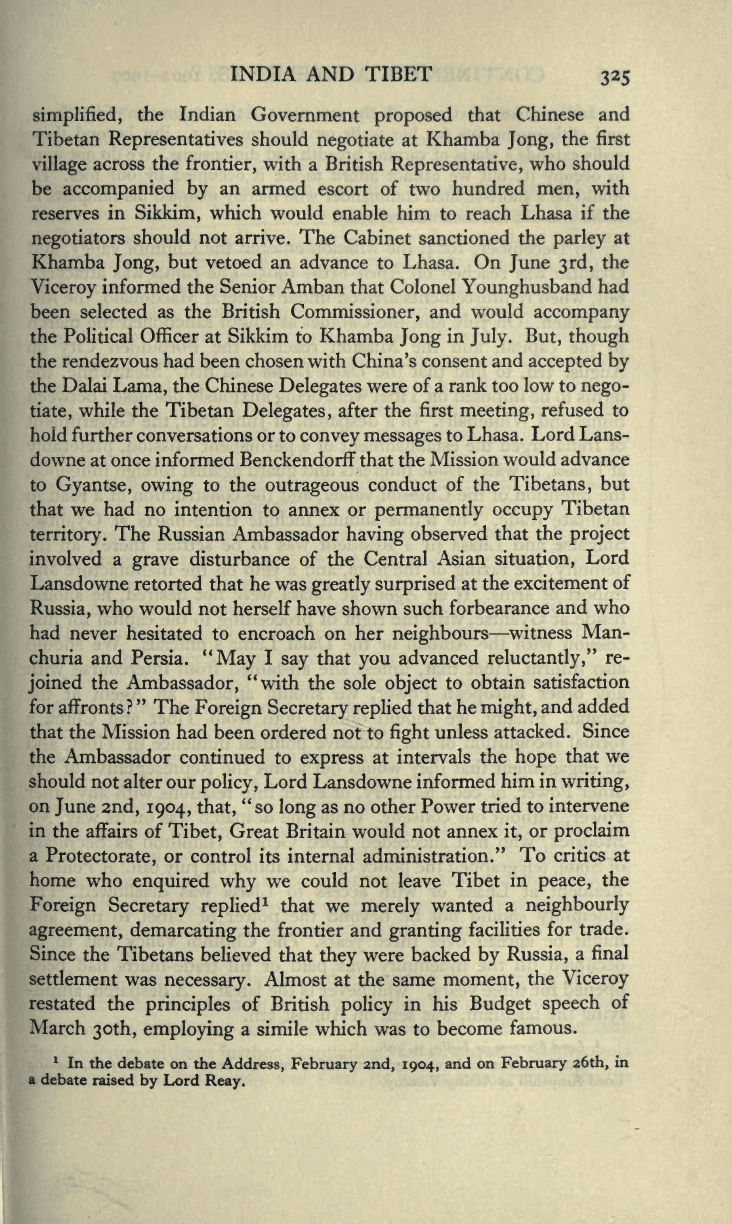
INDIA AND TIBET
325
simplified,
the Indian
Government
proposed
that
Chinese
and
Tibetan
Representatives
should
negotiate
at
Khamba
Jong,
the
first
village
across
the
frontier,
with a
British
Representative,
who should
be
accompanied by
an
armed
escort
of
two
hundred
men,
with
reserves
in
Sikkim,
which would
enable
him
to
reach
Lhasa
if
the
negotiators
should
not
arrive.
The
Cabinet sanctioned the
parley
at
Khamba
Jong,
but vetoed an
advance
to
Lhasa.
On
June
3rd,
the
Viceroy
informed the
Senior Amban
that
Colonel
Younghusband
had
been
selected
as
the
British
Commissioner,
and
would
accompany
the
Political
Officer
at
Sikkim
to
Khamba
Jong
in
July.
But,
though
the rendezvous
had been chosen
with
China's
consent
and
accepted by
the
Dalai
Lama,
the
Chinese
Delegates
were
of
a
rank
too
low
to
nego-
tiate,
while
the Tibetan
Delegates,
after
the
first
meeting,
refused to
hold
further
conversations
or
to
convey messages
to
Lhasa.
Lord Lans-
downe
at
once informed Benckendorff
that the
Mission
would
advance
to
Gyantse, owing
to the
outrageous
conduct
of
the
Tibetans,
but
that we had
no
intention to annex
or
permanently
occupy
Tibetan
territory.
The
Russian Ambassador
having
observed that
the
project
involved a
grave
disturbance
of
the
Central
Asian
situation,
Lord
Lansdowne
retorted
that he
was
greatly
surprised
at the
excitement
of
Russia,
who would
not
herself have
shown such
forbearance
and who
had
never
hesitated to encroach on her
neighbours
—
witness
Man-
churia
and
Persia.
"May
I
say
that
you
advanced
reluctantly,"
re-
joined
the
Ambassador,
"with the
sole
object
to
obtain
satisfaction
for
affronts?
"
The
Foreign
Secretary replied
that
he
might,
and
added
that the Mission had
been ordered
not
to
fight
unless attacked.
Since
the
Ambassador
continued to
express
at intervals
the
hope
that
we
should
not alter
our
policy,
Lord
Lansdowne informed
him
in
writing,
on
June 2nd,
1904,
that,
"so
long
as
no
other
Power tried
to
intervene
in
the affairs of
Tibet,
Great Britain
would not
annex
it,
or
proclaim
a
Protectorate,
or
control
its
internal administration.
"
To
critics
at
home who
enquired why
we could not leave
Tibet
in
peace,
the
Foreign
Secretary
replied
1
that
we
merely
wanted
a
neighbourly
agreement,
demarcating
the frontier
and
granting
facilities
for
trade.
Since
the
Tibetans believed
that
they
were backed
by
Russia,
a
final
settlement
was
necessary.
Almost
at the
same
moment,
the
Viceroy
restated
the
principles
of
British
policy
in
his
Budget
speech
of
March
30th,
employing
a simile
which was
to
become
famous.
1
In
the debate
on the
Address,
February
2nd,
1904,
and
on
February
26th,
in
a
debate
raised
by
Lord
Reay.
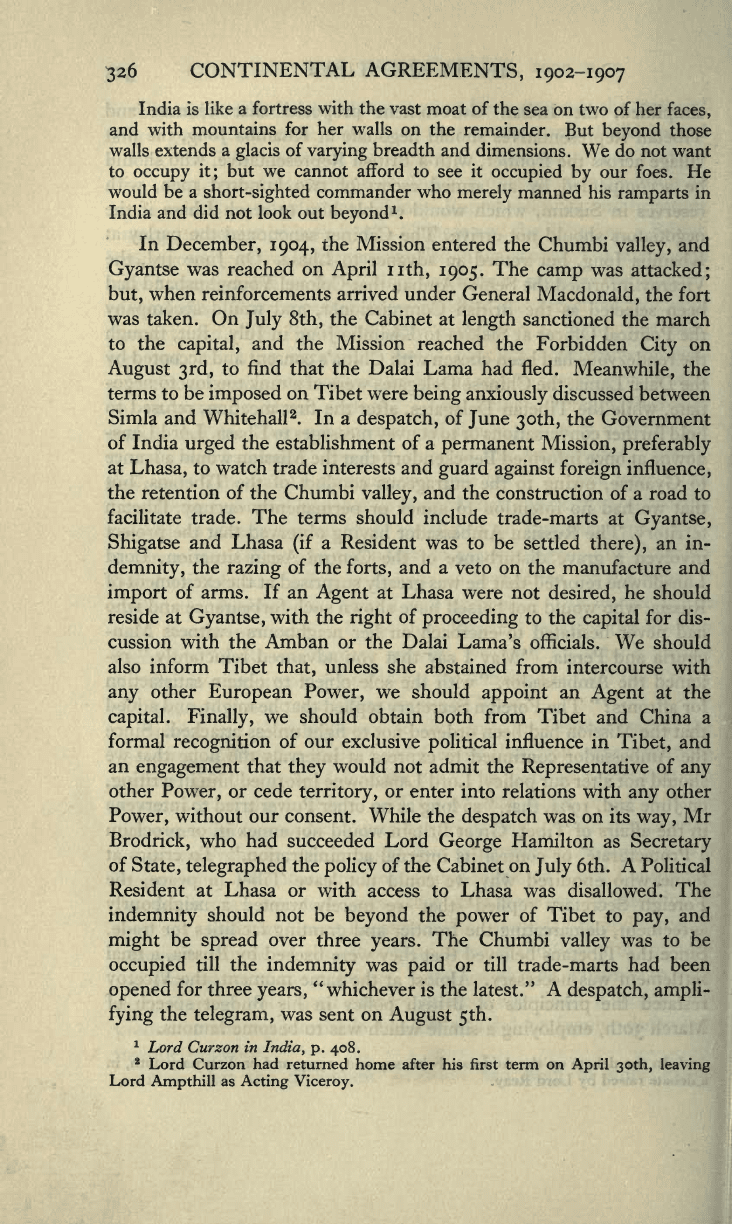
326
CONTINENTAL
AGREEMENTS,
1902-1907
India
is like
a
fortress
with
the vast
moat
of
the sea on
two of
her
faces,
and with
mountains for her walls on
the
remainder. But
beyond
those
walls
extends
a
glacis
of
varying
breadth
and
dimensions. We
do not
want
to
occupy
it;
but we cannot afford to
see it
occupied
by
our
foes. He
would be
a
short-sighted
commander who
merely
manned his
ramparts
in
India and did not look
out
beyond
1
.
In
December,
1904,
the
Mission
entered the
Chumbi
valley,
and
Gyantse
was reached
on
April
nth,
1905.
The
camp
was
attacked;
but,
when
reinforcements
arrived under
General
Macdonald,
the
fort
was taken. On
July
8th,
the
Cabinet
at
length
sanctioned
the
march
to
the
capital,
and
the Mission
reached the Forbidden
City
on
August
3rd,
to
find
that the Dalai
Lama
had
fled.
Meanwhile,
the
terms to be
imposed
on
Tibet were
being
anxiously
discussed
between
Simla and
Whitehall
2
.
In
a
despatch,
of
June
30th,
the
Government
of
India
urged
the
establishment
of a
permanent
Mission,
preferably
at
Lhasa,
to watch trade interests and
guard against
foreign
influence,
the
retention
of
the Chumbi
valley,
and
the
construction
of
a road
to
facilitate trade.
The
terms
should
include
trade-marts
at
Gyantse,
Shigatse
and
Lhasa
(if
a
Resident
was to
be
settled
there),
an
in-
demnity,
the
razing
of
the
forts,
and a
veto
on
the
manufacture
and
import
of arms.
If an
Agent
at
Lhasa
were
not
desired,
he
should
reside
at
Gyantse,
with
the
right
of
proceeding
to the
capital
for
dis-
cussion with the
Amban
or
the Dalai Lama's
officials.
We
should
also inform
Tibet
that,
unless she
abstained from
intercourse with
any
other
European
Power,
we should
appoint
an
Agent
at the
capital.
Finally,
we should obtain
both
from
Tibet
and China a
formal
recognition
of
our
exclusive
political
influence in
Tibet,
and
an
engagement
that
they
would
not admit the
Representative
of
any
other
Power,
or cede
territory,
or
enter
into relations with
any
other
Power,
without
our
consent.
While
the
despatch
was on
its
way,
Mr
Brodrick,
who
had
succeeded Lord
George
Hamilton
as
Secretary
of
State,
telegraphed
the
policy
of
the
Cabinet
on
July
6th.
A Political
Resident at Lhasa or
with
access
to Lhasa was
disallowed.
The
indemnity
should
not
be
beyond
the
power
of
Tibet to
pay,
and
might
be
spread
over
three
years.
The Chumbi
valley
was to
be
occupied
till the
indemnity
was
paid
or
till
trade-marts
had
been
opened
for
three
years,
"whichever is
the
latest." A
despatch, ampli-
fying
the
telegram,
was
sent
on
August
5th.
1
Lord
Curzon in
India,
p.
408.
2
Lord Curzon
had returned
home
after
his first
term
on
April
30th, leaving
Lord
Ampthill
as
Acting
Viceroy.
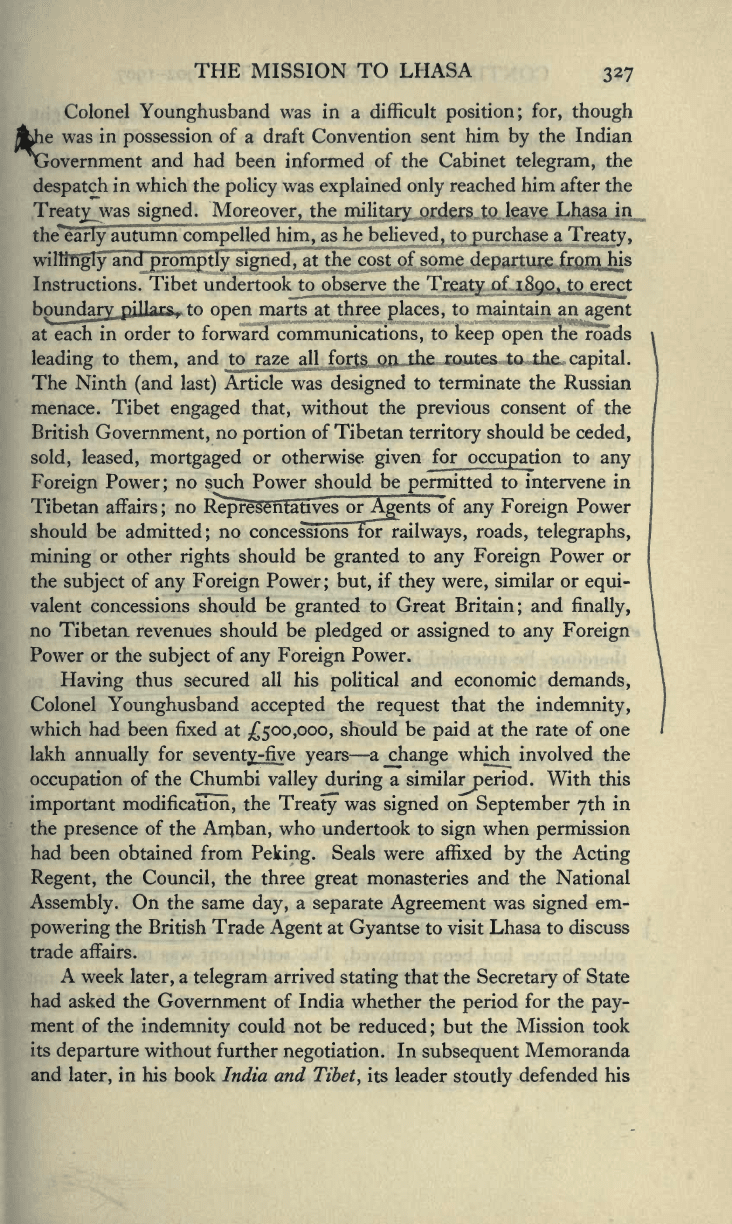
THE
MISSION
TO
LHASA
327
Colonel
Younghusband
was
in
a
difficult
position;
for,
though
Jthe
was
in
possession
of
a draft Convention
sent
him
by
the Indian
"Government and
had
been informed of the Cabinet
telegram,
the
despatch
in which the
policy
was
explained only
reached
him
after the
Treaty
was
signed.
Moreover,
the
military
orders to
leave
Lhasa
in
the
early
autumn
co
mpelled
him,
as
he
believed,
to
p
urchase a
Treaty,
willingly
and
promptly signed,
at the
cost
of
some
departure
from his
Instructions. Tibet undertook to
observe
the
Treaty
of
1890,
to
erect
boundajxjaillax&r
to
open
marts at
three
places,
to
maintain an
agent
at each
in order
to forward
communications,
to
keep open
the
roads
leading
to
them,
and to raze all
forts
on
the
routes
to the
capital.
The Ninth
(and last)
Article was
designed
to terminate the Russian
menace. Tibet
engaged
that,
without
the
previous
consent of
the
British
Government,
no
portion
of
Tibetan
territory
should
be
ceded,
sold,
leased,
mortgaged
or
otherwise
given
for
occupat
ion
to
any
Foreign
Power;
no
such
Power
should
be
permitted
to intervene
in
Tibetan
affairs
;
no
Representatives
or
Agents
of
any
Foreign
Power
should
be
admitted;
no concessions for
railways,
roads,
telegraphs,
mining
or
other
rights
should be
granted
to
any Foreign
Power or
the
subject
of
any Foreign
Power;
but,
if
they
were,
similar
or
equi-
valent
concessions
should
be
granted
to Great
Britain;
and
finally,
no
Tibetan
revenues
should be
pledged
or
assigned
to
any Foreign
Power
or
the
subject
of
any Foreign
Power.
Having
thus
secured
all
his
political
and economic
demands,
Colonel
Younghusband
accepted
the
request
that the
indemnity,
which had been fixed
at
£500,000,
should be
paid
at the rate
of
one
lakh
annually
for
seventy-five years
—
a_change
which
involved the
occupation
of
the
Chumbi
valley during
a
similarperiod.
With this
important
modification,
the
Treaty
was
signed
on
September 7th
in
the
presence
of
the
Amban,
who
undertook to
sign
when
permission
had
been
obtained
from
Peking.
Seals were affixed
by
the
Acting
Regent,
the
Council,
the
three
great
monasteries
and
the National
Assembly.
On
the
same
day,
a
separate
Agreement
was
signed
em-
powering
the British Trade
Agent
at
Gyantse
to
visit
Lhasa to
discuss
trade affairs.
A
week
later,
a
telegram
arrived
stating
that the
Secretary
of
State
had
asked
the
Government
of India
whether
the
period
for
the
pay-
ment
of
the
indemnity
could
not
be
reduced
;
but the
Mission
took
its
departure
without further
negotiation.
In
subsequent
Memoranda
and
later,
in
his book
India and
Tibet,
its leader
stoutly
defended his
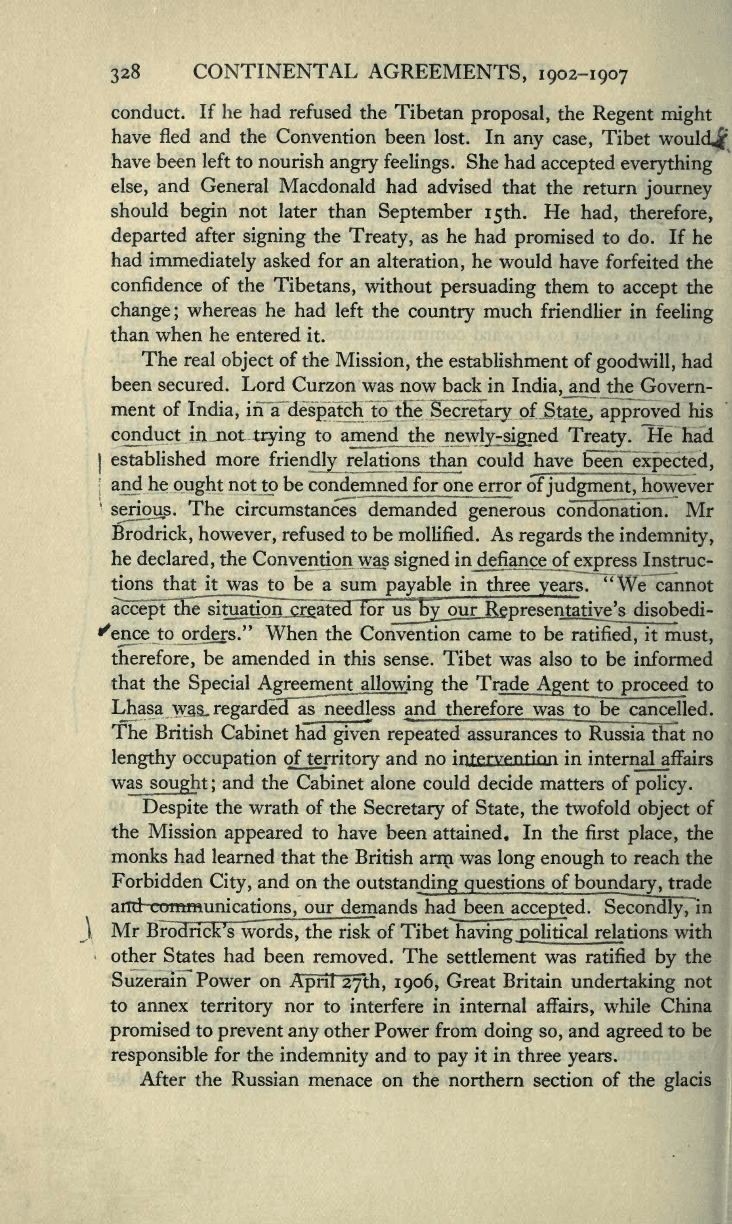
328
CONTINENTAL
AGREEMENTS,
1902-1907
conduct.
If
he
had
refused
the
Tibetan
proposal,
the
Regent
might
have fled
and
the
Convention
been
lost.
In
any
case,
Tibet
would^'
have
been
left to nourish
angry
feelings.
She had
accepted
everything
else,
and
General
Macdonald had
advised
that the return
journey
should
begin
not later
than
September
15th.
He
had,
therefore,
departed
after
signing
the
Treaty,
as he
had
promised
to
do. If
he
had
immediately
asked for
an
alteration,
he would
have
forfeited the
confidence
of
the
Tibetans,
without
persuading
them
to
accept
the
change;
whereas he
had
left the
country
much
friendlier in
feeling
than
when he
entered
it.
The
real
object
of
the
Mission,
the
establishment
of
goodwill,
had
been
secured. Lord
Curzon
was now back in
India,
_and
the Govern-
ment
of
India,
in
a
desp
atch
to the
Secretary
of
State,
approved
his
conduct
in
not
trying
to
amend
the
newly-signed
Treaty.
He had
]
established more
friendly
relations
than
could
have
Seen
expected,
and he
ought
not to be
condemned for
one error
of
judgment,
however
'
serious.
The
circumstances
demanded
generous
concTonation.
Mr
Brodrick,
however,
refused
to be mollified. As
regards
the
indemnity,
he
declared,
the
Convention was
signed
in
defiance of
express
Instruc-
tions
that
jt
was
tt)
be
a sum
paya
ble
in
three
years
.
"We
cannot
accept
the
situatjon^^rgatecl
for
us
Ej^ojj^^presentatiyej
disobedi-
^ence
to orders."
When
the
Convention came
to
be
ratified,
it
must,
therefore,
be
amended in
this sense.
Tibet
was also
to be informed
that
the
Special
Agreement^
allowing
the
Trade^^entto
proceed
to
Lhasa
was-
regardecTa
s
needless and
therefore was
to
be
cancelled.
The
British
Cabinet
had
given repeated
assurances
to Russia
that
no
lengthy occupation
of
territory
and
no
intervention
in
internal
a
ffairs
was
so
ught ;
and
the
Cabinet
alone could decide
matters
of
policy.
Despite
the wrath
of
the
Secretary
of
State,
the
twofold
object
of
the
Mission
appeared
to have been
attained.
In
the
first
place,
the
monks
had
learned
that the
British arm was
long
enough
to reach
the
Forbidden
City,
and on
the
outsta
nding questions
of
boundar
y,
trade
and-
comm
unica
tions,
our
dem
ands ha
d been
accepte
d.
Secondly,
in
Mr
Brocfrick's
words,
the
risk
of
Tibet
having political
rela
tions
with
other States had
been
removed. The
settlement
was
ratified
by
the
Suzerain Power on
April
27th,
1906,
Great Britain
undertaking
not
to annex
territory
nor
to interfere
in
internal
affairs,
while China
promised
to
prevent
any
other Power
from
doing
so,
and
agreed
to
be
responsible
for
the
indemnity
and
to
pay
it
in
three
years.
After the Russian
menace on the northern section
of
the
glacis
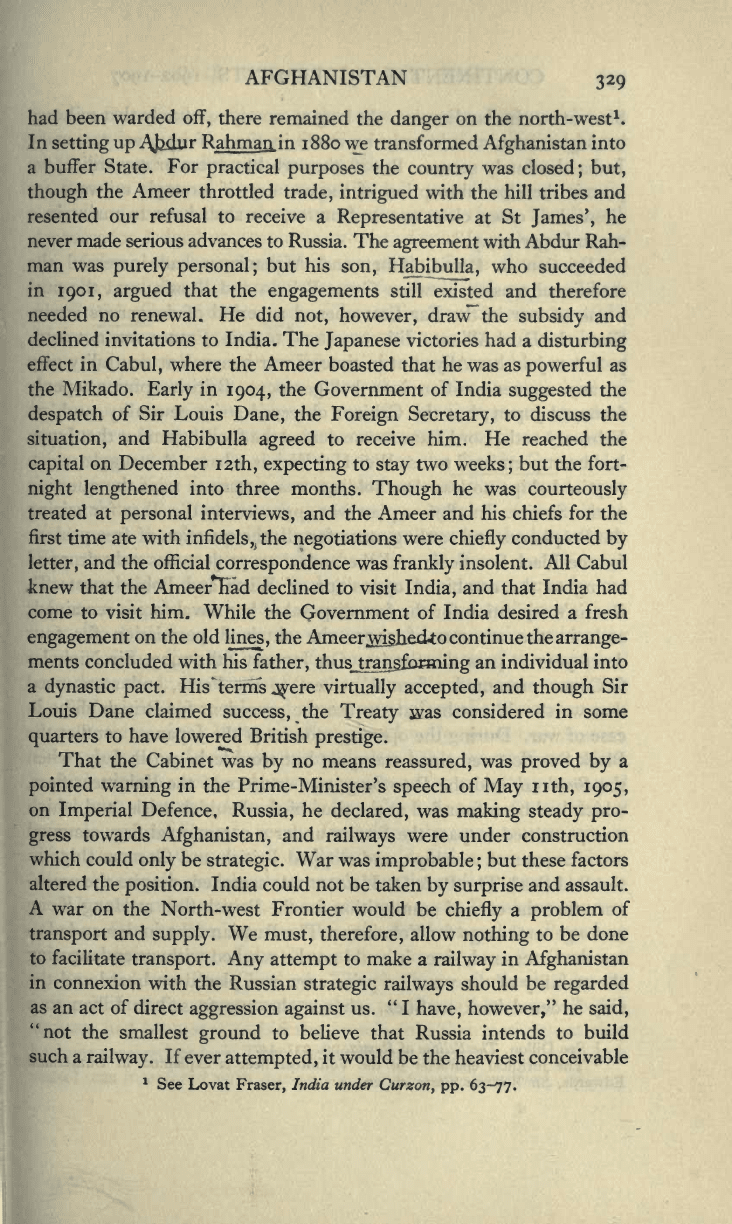
AFGHANISTAN
329
had been
warded
off,
there
remained
the
danger
on
the
north-west
1
.
In
setting
up
AJidnr
Rahmaq
in
1880
we
transformed
Afghanistan
into
a buffer State.
For
practical
purposes
the
country
was
closed;
but,
though
the
Ameer
throttled
trade,
intrigued
with the
hill
tribes
and
resented
our
refusal
to receive a
Representative
at
St
James',
he
never made serious advances to
Russia.
The
agreement
with
Abdur
Rah-
man was
purely
personal;
but
his
son,
Habibulla,
who
succeeded
in
1901, argued
that the
engagements
still
existed
and
therefore
needed no
renewal. He
did
not,
however,
draw
the
subsidy
and
declined
invitations to
India.
The
Japanese
victories
had
a
disturbing
effect
in
Cabul,
where
the
Ameer
boasted that
he was as
powerful
as
the
Mikado.
Early
in
1904,
the
Government
of
India
suggested
the
despatch
of Sir
Louis
Dane,
the
Foreign Secretary,
to
discuss the
situation,
and Habibulla
agreed
to
receive
him. He
reached the
capital
on
December
12th,
expecting
to
stay
two
weeks;
but the fort-
night lengthened
into three months.
Though
he was
courteously
treated at
personal
interviews,
and
the
Ameer and
his chiefs
for
the
first
time ate with
infidels,
the
negotiations
were
chiefly
conducted
by
letter,
and
the official
correspondence
was
frankly
insolent.
All Cabul
knew
that
the
Ameer nad
declined
to
visit
India,
and
that
India had
come
to
visit
him.
While
the
Government
of
India
desired a
fresh
engagement
on
the
old
lines,
the
Ameer
j
wjsiiedio
continue
the
arrange-
ments concluded
with his
father,
thus_tran$forming
an
individual
into
a
dynastic pact.
His
terms
j^ere
virtually accepted,
and
though
Sir
Louis
Dane claimed
success,
the
Treaty
was considered
in some
quarters
to
have
lowered
British
prestige.
That the
Cabinet was
by
no
means
reassured,
was
proved
by
a
pointed
warning
in
the
Prime-Minister's
speech
of
May
nth,
1905,
on
Imperial
Defence,
Russia,
he
declared,
was
making steady
pro-
gress
towards
Afghanistan,
and
railways
were under construction
which
could
only
be
strategic.
War
was
improbable
;
but
these
factors
altered the
position.
India
could
not be
taken
by
surprise
and assault.
A
war on
the
North-west Frontier would
be
chiefly
a
problem
of
transport
and
supply.
We
must,
therefore,
allow
nothing
to
be
done
to
facilitate
transport.
Any attempt
to make a
railway
in
Afghanistan
in
connexion
with
the Russian
strategic
railways
should
be
regarded
as
an
act of
direct
aggression against
us. "I
have,
however,"
he
said,
"not the
smallest
ground
to believe that Russia intends
to
build
such
a
railway.
If
ever
attempted,
it would
be
the
heaviest
conceivable
1
See
Lovat
Fraser,
India
under
Curzon, pp. 63^77.
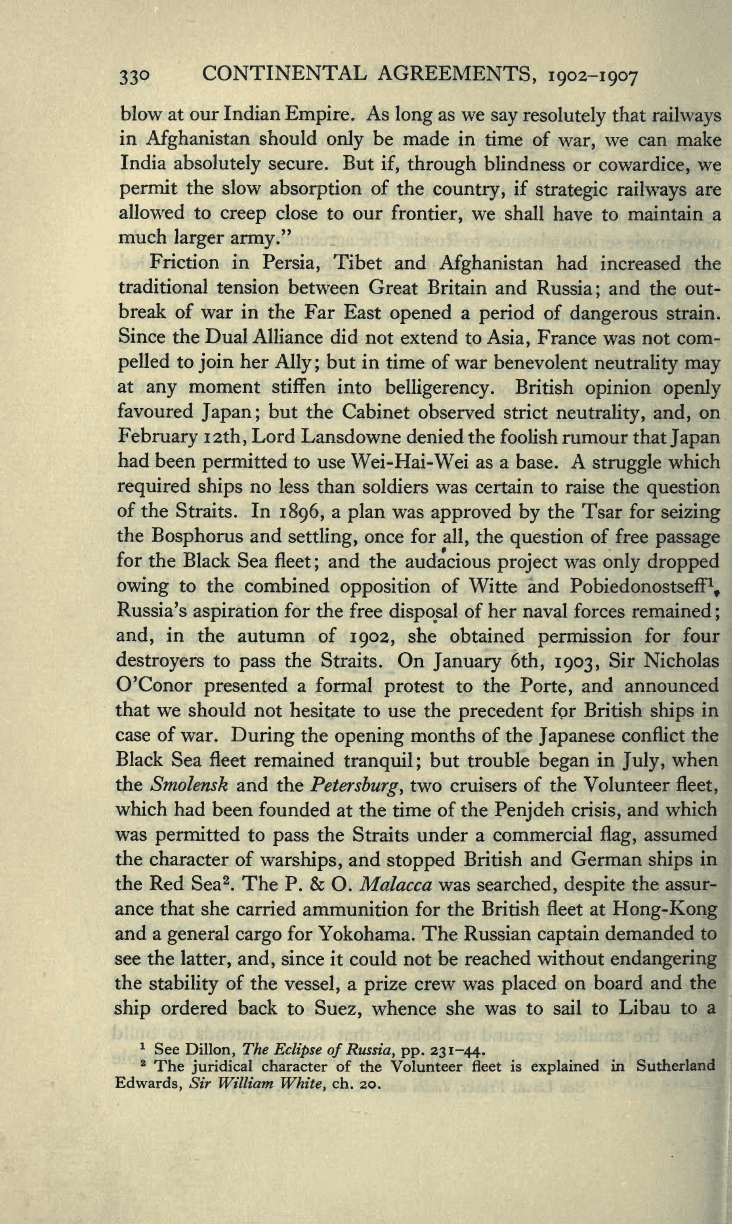
330
CONTINENTAL
AGREEMENTS,
1902-1907
blow
at
our
Indian
Empire.
As
long
as we
say
resolutely
that
railways
in
Afghanistan
should
only
be
made
in
time
of
war,
we
can make
India
absolutely
secure.
But
if,
through
blindness or
cowardice,
we
permit
the
slow
absorption
of
the
country,
if
strategic
railways
are
allowed
to
creep
close to
our
frontier,
we
shall
have to maintain
a
much
larger
army."
Friction in
Persia,
Tibet
and
Afghanistan
had
increased
the
traditional
tension
between
Great Britain
and
Russia;
and the out-
break of
war
in
the Far
East
opened
a
period
of
dangerous
strain.
Since
the
Dual
Alliance
did
not extend to
Asia,
France
was not
com-
pelled
to
join
her
Ally
;
but
in
time of war
benevolent
neutrality
may
at
any
moment stiffen
into
belligerency.
British
opinion openly
favoured
Japan;
but the
Cabinet observed
strict
neutrality,
and,
on
February
12th,
Lord
Lansdowne denied
the foolish rumour that
Japan
had
been
permitted
to use
Wei-Hai-Wei as a base. A
struggle
which
required
ships
no
less than
soldiers
was
certain to raise the
question
of
the
Straits.
In
1896,
a
plan
was
approved
by
the
Tsar
for
seizing
the
Bosphorus
and
settling,
once
for
all,
the
question
of
free
passage
for
the Black
Sea
fleet
;
and
the audacious
project
was
only
dropped
owing
to the
combined
opposition
of
Witte
and Pobiedonostseff
1
,
Russia's
aspiration
for
the free
disposal
of
her naval forces
remained
;
and,
in
the
autumn of
1902,
she obtained
permission
for
four
destroyers
to
pass
the
Straits.
On
January
6th,
1903,
Sir
Nicholas
O'Conor
presented
a formal
protest
to the
Porte,
and
announced
that we should
not
hesitate
to
use
the
precedent
for
British
ships
in
case
of
war.
During
the
opening
months
of the
Japanese
conflict
the
Black
Sea
fleet
remained
tranquil;
but trouble
began
in
July,
when
the
Smolensk and
the
Petersburg,
two
cruisers
of
the
Volunteer
fleet,
which
had been
founded at the
time
of
the
Penjdeh
crisis,
and which
was
permitted
to
pass
the
Straits
under
a commercial
flag,
assumed
the
character of
warships,
and
stopped
British
and German
ships
in
the
Red Sea
2
.
The P. &
O. Malacca was
searched,
despite
the
assur-
ance
that
she
carried
ammunition
for
the
British
fleet at
Hong-Kong
and a
general cargo
for
Yokohama.
The
Russian
captain
demanded to
see the
latter, and,
since
it
could not
be reached without
endangering
the
stability
of
the
vessel,
a
prize
crew was
placed
on
board and
the
ship
ordered back
to
Suez,
whence
she was to
sail
to
Libau to
a
1
See
Dillon,
The
Eclipse of Russia,
pp.
231-44.
2
The
juridical
character of
the
Volunteer
fleet
is
explained
in Sutherland
Edwards,
Sir William
White,
ch.
20.
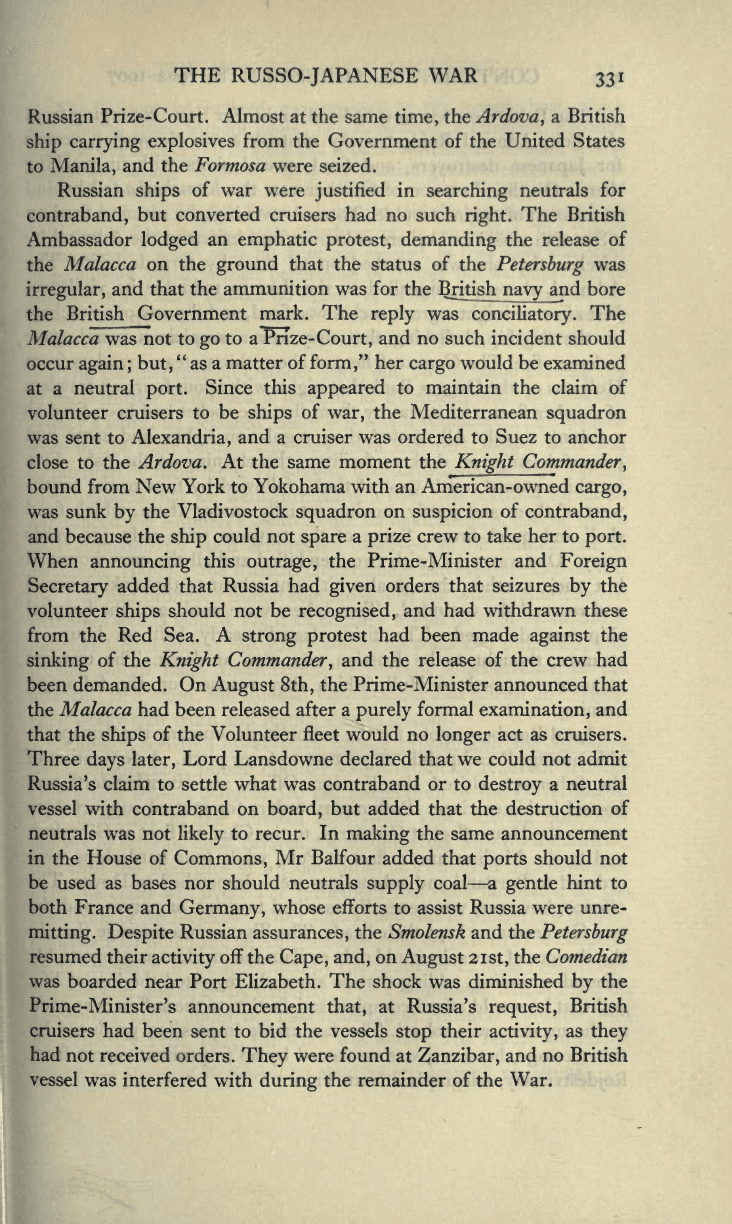
THE
RUSSO-JAPANESE
WAR
331
Russian
Prize-Court.
Almost at the
same
time,
the
Ardova,
a
British
ship
carrying
explosives
from
the
Government
of
the
United States
to
Manila,
and the
Formosa
were
seized.
Russian
ships
of
war were
justified
in
searching
neutrals
for
contraband,
but
converted cruisers
had
no
such
right.
The British
Ambassador
lodged
an
emphatic protest,
demanding
the
release
of
the
Malacca
on
the
ground
that the
status
of
the
Petersburg
was
irregular,
and that
the ammunition
was for
the
British
navy
an
d
bore
the
Briti
sh
Government
mark.
The
reply
was
conciliatory.
The
Malacca was not to
go
to
a Prize-
Court,
and
no
such
incident
should
occur
again
;
but,
"
as
a
matter
of
form,"
her
cargo
would be
examined
at
a neutral
port.
Since
this
appeared
to maintain the claim
of
volunteer
cruisers
to
be
ships
of
war,
the Mediterranean
squadron
was sent to
Alexandria,
and a cruiser was ordered
to
Suez
to
anchor
close to
the
Ardova. At the
same
moment the
Knight
Com
mander,
bound from New
York
to
Yokohama with an American-owned
cargo,
was
sunk
by
the
Vladivostock
squadron
on
suspicion
of
contraband,
and
because the
ship
could not
spare
a
prize
crew
to
take her to
port.
When
announcing
this
outrage,
the Prime-Minister
and
Foreign
Secretary
added
that
Russia
had
given
orders that
seizures
by
the
volunteer
ships
should not be
recognised,
and
had
withdrawn
these
from
the
Red Sea. A
strong protest
had been made
against
the
sinking
of
the
Knight
Commander,
and the release
of
the crew
had
been
demanded.
On
August
8th,
the Prime-Minister announced
that
the
Malacca had been
released after
a
purely
formal
examination,
and
that the
ships
of
the Volunteer
fleet
would no
longer
act as cruisers.
Three
days
later,
Lord Lansdowne declared
that
we
could
not admit
Russia's claim
to settle what
was
contraband
or
to
destroy
a neutral
vessel
with
contraband
on
board,
but added
that the destruction
of
neutrals
was
not
likely
to recur.
In
making
the same announcement
in
the House
of
Commons,
Mr
Balfour
added
that
ports
should not
be
used as bases nor should neutrals
supply
coal
—
a
gentle
hint
to
both
France
and
Germany,
whose efforts to
assist
Russia were
unre-
mitting.
Despite
Russian
assurances,
the Smolensk
and the
Petersburg
resumed
their
activity
off the
Cape,
and,
on
August
21st,
the
Comedian
was
boarded near
Port
Elizabeth.
The shock
was
diminished
by
the
Prime-Minister's
announcement
that,
at Russia's
request,
British
cruisers had
been
sent to
bid
the
vessels
stop
their
activity,
as
they
had
not received
orders.
They
were
found
at
Zanzibar,
and
no
British
vessel
was
interfered with
during
the remainder of the War.
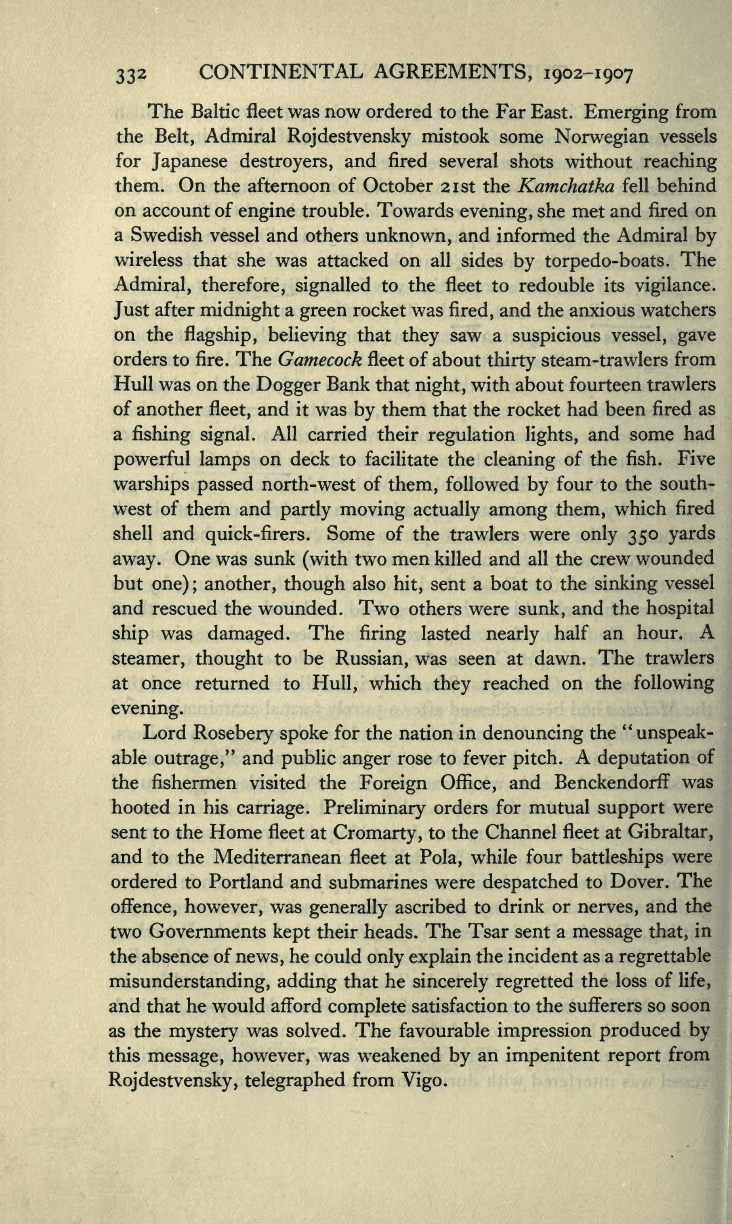
332
CONTINENTAL
AGREEMENTS,
1902-1907
The Baltic
fleet was now ordered
to the Far
East.
Emerging
from
the
Belt,
Admiral
Rojdestvensky
mistook
some
Norwegian
vessels
for
Japanese
destroyers,
and
fired
several
shots
without
reaching
them.
On
the
afternoon
of October
21st the
Kamchatka fell
behind
on
account
of
engine
trouble. Towards
evening,
she
met
and
fired
on
a
Swedish vessel and
others
unknown,
and
informed
the
Admiral
by
wireless
that she was attacked
on
all
sides
by
torpedo-boats.
The
Admiral,
therefore,
signalled
to the
fleet to
redouble
its
vigilance.
Just
after
midnight
a
green
rocket was
fired,
and the
anxious
watchers
on
the
flagship,
believing
that
they
saw a
suspicious
vessel,
gave
orders
to fire. The Gamecock
fleet of
about
thirty
steam-trawlers
from
Hull
was
on
the
Dogger
Bank
that
night,
with about
fourteen trawlers
of
another
fleet,
and
it
was
by
them
that the
rocket
had been
fired as
a
fishing signal.
All
carried their
regulation lights,
and
some
had
powerful
lamps
on
deck
to
facilitate
the
cleaning
of
the
fish.
Five
warships
passed
north-west
of
them,
followed
by
four
to
the
south-
west
of
them and
partly moving
actually
among
them,
which
fired
shell and
quick-firers.
Some of
the trawlers
were
only
350
yards
away.
One was sunk
(with
two
men
killed and
all
the
crew
wounded
but
one)
; another,
though
also
hit,
sent a
boat to the
sinking
vessel
and rescued
the wounded. Two
others were
sunk,
and
the
hospital
ship
was
damaged.
The
firing
lasted
nearly
half
an
hour.
A
steamer,
thought
to
be
Russian,
was seen at
dawn. The
trawlers
at once
returned
to
Hull,
which
they
reached
on the
following
evening.
Lord
Rosebery
spoke
for
the nation
in
denouncing
the
"unspeak-
able
outrage,"
and
public
anger
rose
to
fever
pitch.
A
deputation
of
the fishermen
visited the
Foreign
Office,
and BenckendorfT
was
hooted
in
his
carriage. Preliminary
orders
for
mutual
support
were
sent to the Home
fleet at
Cromarty,
to the
Channel fleet at
Gibraltar,
and
to
the Mediterranean fleet
at
Pola,
while
four
battleships
were
ordered
to Portland
and
submarines were
despatched
to
Dover.
The
offence, however,
was
generally
ascribed to
drink or
nerves,
and the
two Governments
kept
their
heads.
The Tsar
sent
a
message
that,
in
the
absence
of
news,
he could
only
explain
the incident
as a
regrettable
misunderstanding,
adding
that
he
sincerely
regretted
the
loss
of
life,
and
that
he would
afford
complete
satisfaction to the
sufferers so
soon
as the
mystery
was
solved. The favourable
impression
produced by
this
message,
however,
was weakened
by
an
impenitent
report
from
Rojdestvensky,
telegraphed
from
Vigo.
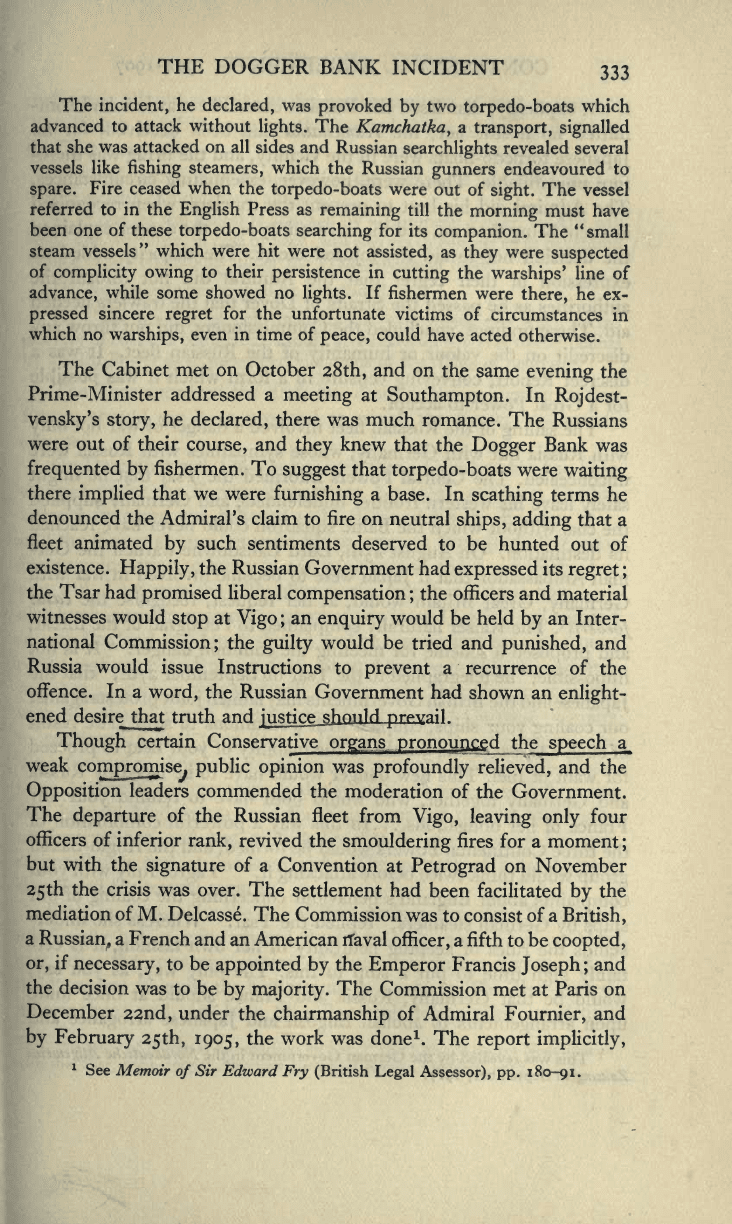
THE
DOGGER
BANK
INCIDENT
333
The
incident,
he
declared,
was
provoked
by
two
torpedo-boats
which
advanced
to attack
without
lights.
The
Kamchatka,
a
transport, signalled
that
she was attacked
on
all
sides
and
Russian
searchlights
revealed several
vessels like
fishing
steamers,
which
the
Russian
gunners
endeavoured
to
spare.
Fire
ceased
when the
torpedo-boats
were out
of
sight.
The vessel
referred
to in
the
English
Press as
remaining
till
the
morning
must have
been one
of
these
torpedo-boats
searching
for
its
companion.
The
"small
steam vessels"
which were hit
were
not
assisted,
as
they
were
suspected
of
complicity
owing
to
their
persistence
in
cutting
the
warships'
line of
advance,
while some
showed no
lights.
If
fishermen
were
there,
he ex-
pressed
sincere
regret
for
the
unfortunate
victims of
circumstances in
which no
warships,
even
in
time of
peace,
could
have
acted
otherwise.
The
Cabinet met
on
October
28th,
and
on
the same
evening
the
Prime-Minister addressed a
meeting
at
Southampton.
In
Rojdest-
vensky's story,
he
declared,
there was
much
romance. The
Russians
were
out
of
their
course,
and
they
knew
that the
Dogger
Bank
was
frequented
by
fishermen. To
suggest
that
torpedo-boats
were
waiting
there
implied
that we were
furnishing
a
base.
In
scathing
terms he
denounced
the
Admiral's claim
to fire
on
neutral
ships,
adding
that
a
fleet animated
by
such
sentiments
deserved
to
be
hunted
out
of
existence.
Happily,
the
Russian
Government had
expressed
its
regret
;
the Tsar had
promised
liberal
compensation
;
the
officers
and
material
witnesses would
stop
at
Vigo
;
an
enquiry
would
be held
by
an
Inter-
national
Commission;
the
guilty
would
be
tried and
punished,
and
Russia would
issue
Instructions
to
prevent
a
recurrence
of
the
offence. In a
word,
the Russian
Government
had
shown
an
enlight-
ened
desire
that truth
and
justice
should
prev
ail.
Though
certain
Conserva
tive
organs
pronounced
the
speech a_
weak
compromise,
public
opinion
was
profoundly
relieved,
and
the
Opposition
leaders
commended
the
moderation
of
the
Government.
The
departure
of
the Russian
fleet
from
Vigo, leaving only
four
officers of
inferior
rank,
revived
the
smouldering
fires
for a
moment;
but with
the
signature
of
a
Convention
at
Petrograd
on
November
25th
the
crisis
was over.
The
settlement
had
been
facilitated
by
the
mediation of
M.
Delcasse. The Commission
was
to
consist
of a
British,
a
Russian,
a French
and an
American itaval
officer,
a
fifth to
be
coopted,
or,
if
necessary,
to be
appointed
by
the
Emperor
Francis
Joseph
;
and
the
decision
was
to be
by
majority.
The
Commission met at
Paris
on
December
22nd,
under
the
chairmanship
of
Admiral
Fournier,
and
by
February
25th,
1905,
the
work
was
done
1
. The
report
implicitly,
1
See
Memoir
of
Sir
Edward
Fry (British
Legal Assessor), pp. 180-91.
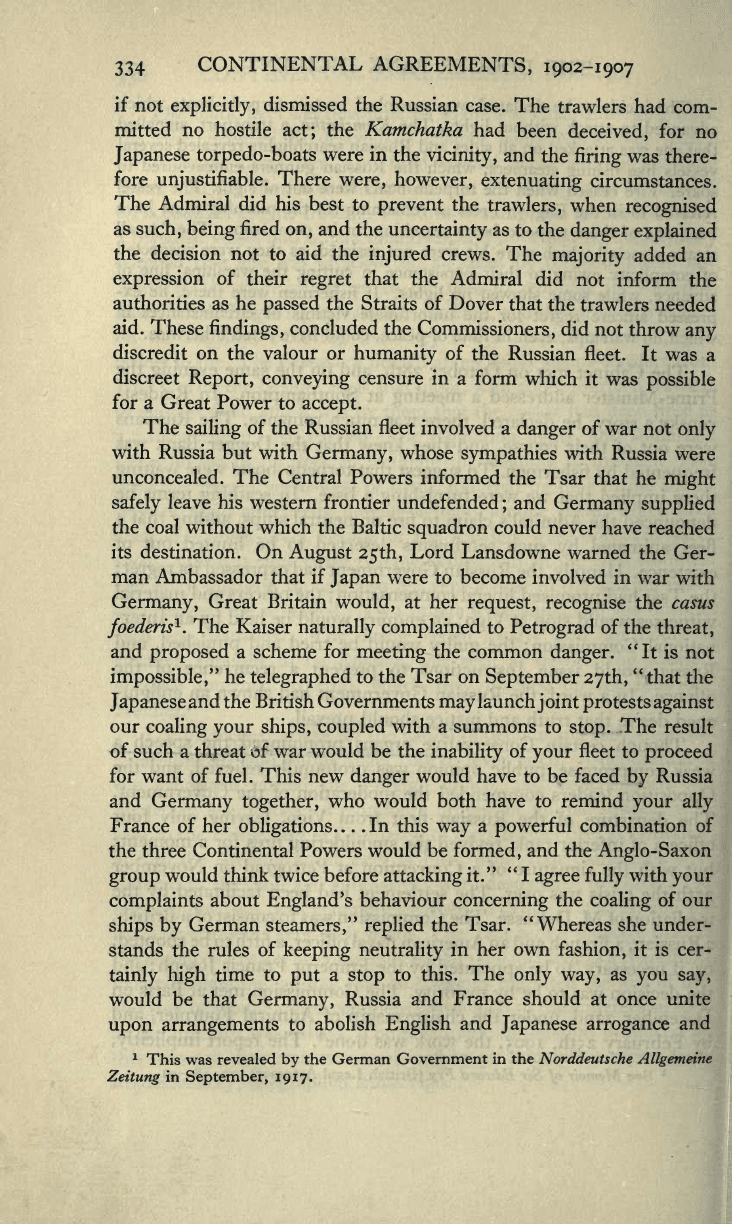
334
CONTINENTAL
AGREEMENTS,
1902-1907
if
not
explicitly,
dismissed
the Russian
case.
The
trawlers
had
com-
mitted
no
hostile
act;
the
Kamchatka
had
been
deceived,
for
no
Japanese
torpedo-boats
were
in
the
vicinity,
and
the
firing
was
there-
fore
unjustifiable.
There
were, however,
extenuating
circumstances.
The Admiral did his
best to
prevent
the
trawlers,
when
recognised
as
such,
being
fired
on,
and
the
uncertainty
as
to
the
danger
explained
the decision
not to
aid
the
injured
crews. The
majority
added an
expression
of
their
regret
that the
Admiral
did
not
inform
the
authorities
as
he
passed
the Straits
of
Dover
that the
trawlers
needed
aid.
These
findings,
concluded
the
Commissioners,
did
not throw
any
discredit
on
the
valour or
humanity
of
the Russian
fleet.
It was a
discreet
Report,
conveying
censure in
a form
which
it was
possible
for
a
Great Power
to
accept.
The
sailing
of the Russian
fleet involved a
danger
of
war
not
only
with Russia
but with
Germany,
whose
sympathies
with
Russia
were
unconcealed. The Central Powers
informed
the Tsar
that he
might
safely
leave his
western frontier undefended
;
and
Germany
supplied
the coal
without
which
the Baltic
squadron
could
never have
reached
its
destination.
On
August 25th,
Lord
Lansdowne
warned
the Ger-
man
Ambassador that
if
Japan
were to
become involved in
war
with
Germany,
Great Britain
would,
at
her
request, recognise
the casus
foederis
1
.
The Kaiser
naturally
complained
to
Petrograd
of
the
threat,
and
proposed
a scheme
for
meeting
the common
danger.
"It
is
not
impossible,"
he
telegraphed
to the
Tsar on
September 27th,
"that the
Japanese
and
the
British
Governments
may
launch
joint
protests
against
our
coaling your
ships, coupled
with a summons
to
stop.
The
result
of
such a
threat
of
war would be the
inability
of
your
fleet to
proceed
for
want
of
fuel.
This new
danger
would have
to
be faced
by
Russia
and
Germany together,
who would
both
have to remind
your ally
France of her
obligations.
...
In
this
way
a
powerful
combination
of
the three
Continental
Powers would be
formed,
and
the
Anglo-Saxon
group
would
think twice
before
attacking
it."
"I
agree fully
with
your
complaints
about
England's
behaviour
concerning
the
coaling
of our
ships
by
German
steamers,"
replied
the
Tsar. "Whereas she under-
stands the
rules
of
keeping
neutrality
in her own
fashion,
it
is cer-
tainly
high
time
to
put
a
stop
to
this.
The
only
way,
as
you
say,
would be
that
Germany,
Russia
and France should
at
once unite
upon
arrangements
to
abolish
English
and
Japanese
arrogance
and
1
This
was revealed
by
the German Government
in the Norddeutsche
Allgemeine
Zeitung
in
September,
1917.
